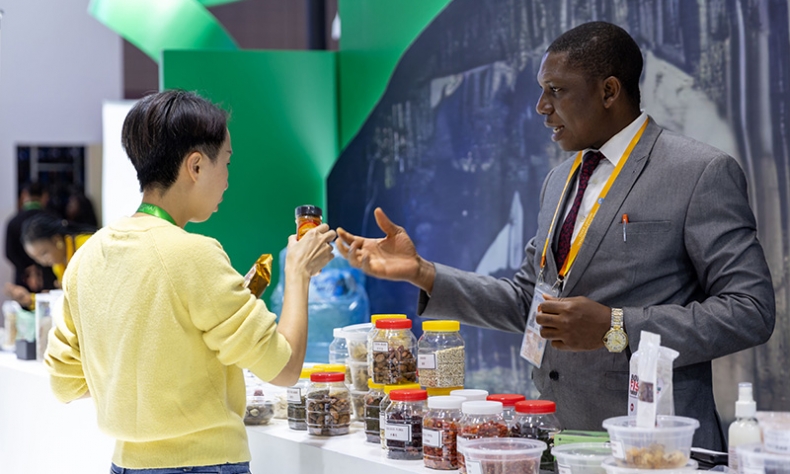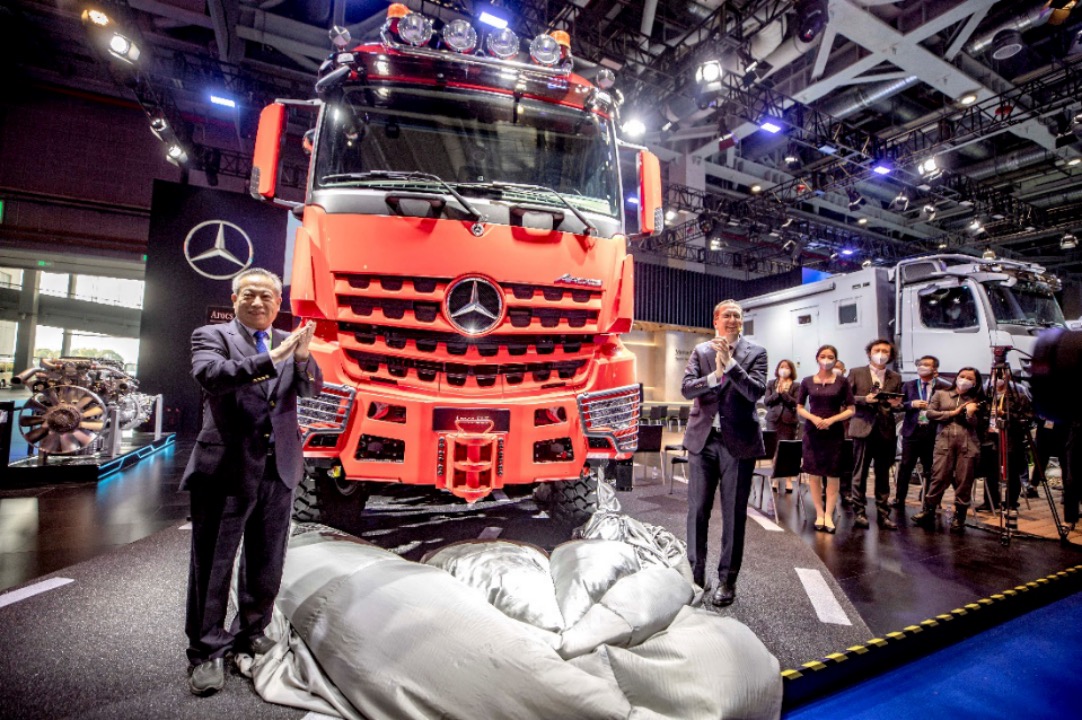Globals Go Local

The opportunities offered by the Chinese market is making multinationals set up joint ventures and production lines in China, boosting the transformation of China’s manufacturing industry.
When the sixth China International Import Expo (CIIE) concluded on November 10, it had consolidated its reputation as an extraordinary platform for manufacturers from all over the world to showcase their latest products.
German specialty glass manufacturing giant SCHOTT AG is one of those industries that has participating in the CIIE for six years. This year, SCHOTT brought nearly 30 new exhibits as well as its star product, the Zerodur glass-ceramic. Due to its low-thermal expansion, Zerodur is used in various hi-tech applications that need exceptional precision, such as telescopes. It is used in large optical equipment such as China’s wide field survey telescope, large sky area multi-object fiber spectroscopic telescope, and the 2.4-meter telescope in Lijiang, a city in Yunnan Province.
Wu Min, sales director of SCHOTT’s advanced optics business unit in Asia-Pacific and deputy general manager of SCHOTT (Shanghai), called China one of the biggest consumer markets and an important investment market for SCHOTT. “China is undergoing industrial upgrading and plays a significant role in the hi-tech sector. This is why we are making greater efforts to invest and build factories in China, expand our localized business in China, and enhance our production capacity and R&D capabilities in China,” Wu said.
From solo to joint ventures
As China continues to deepen its opening-up, SCHOTT is building new production lines and production bases in China. Since 2002, it has invested in building factories in Suzhou in Zhe-jiang Province in east China. Its China headquarters is in Shanghai and major production bases are in Jiangsu and Zhejiang provinces in east China. In 2018, SCHOTT and Crystal-Optech Co., Ltd. established a joint venture, Zhe-jiang Crystal-Schott Optical Technology, manufacturing high-end special optical glass. Today, SCHOTT has nearly 1,000 employees in China and continues to increase investment and build high-end production lines. This supports the transformation and upgrading of China’s manufacturing industry, promoting the focus of “Made in China” from quantity to quality.
Another German giant Daimler Truck is also a regular participant of the CIIE. At the last CIIE, its heavy-duty truck Arocs 4863 8×8 SLT made its debut in China and secured on-site signing, the first vehicle to achieve that since the first CIIE. The Arocs SLT heavy-duty truck played a crucial role in the State Grid Corporation of China’s north-to-south power transmission project. It completed the task of transporting over 500 tonnes of equipment last April, ensuring the construction of the major national project. Daimler Truck has grasped the opportunities that the CIIE provides as a high-level exhibition platform for communication and cooperation and increased its presence on the Chinese market.

At the 6th CIIE, Daimler Truck brought three star products. Among them was the Atego 1023 4×4 off-road motorhome, produced in cooperation with Chinese motorhome brand Yutong RV in response to a thriving recreational vehicle market with record sales and Chinese customers’ growing demand. Holger Scherr, president and CEO of Beijing Foton Daimler Automotive Co., said, “We clearly recognize that the success of Daimler Truck’s localization in China is based on China’s high-quality development. China continually deepens its opening-up and introduces favorable policies and measures to facilitate our business. At the same time, our business highly depends on customer demand. We must fully understand and always remember how to help Chinese customers succeed and meet their growing expectations for the market through products and services.”
This success has strengthened Daimler Truck’s commitment to localized development in China. In September 2023, its joint venture with Beiqi Foton Motor – Beijing Foton Daimler Automotive Co. – held a ceremony in its new factory in Beijing’s Huairou District to celebrate the production of the first batch of localized Mercedes-Benz trucks. With mass production on schedule, Daimler Truck has started a new chapter in its development in China.
From exhibitor to investor
This was also the sixth year at the CIIE for L’Oréal, an “old friend” of the expo. L’Oréal sees the CIIE as a partner. “China has a huge market, and consumers’ demand for high-quality products continues to increase. L’Oréal is committed to introducing new products and technologies to satisfy Chinese consumers’ diverse demand,” said Fabrice Megarbane, president of L’Oréal North Asia and CEO of L’Oréal China. Megarbane called the CIIE a milestone for L’Oréal’s open innovation ecosystem, which has “transformed us from exhibitors to investors.” He stressed L’Oréal’s integration in China: “We understand that innovation not only means bringing products into China but also innovating in China and going global with Chinese technologies.”
At this year’s CIIE, L’Oréal exhibited its latest brands, technologies, products, and investments. The L’Oréal Big Bang Beauty Tech Startup Challenge, piloted in China in 2020, invites domestic tech startups to come up with “revolutionary” beauty tech solutions. In these three years, the core technologies of the winning projects have included artificial intelligence, smart supply chains, intelligent industrial robots, 3D electronic printing and microecological research.
During the opening ceremony of L’Oréal’s main pavilion at the CIIE, Bertrand Lortholary, French ambassador to China, said, “As the largest exhibitor in the consumer goods industry at each CIIE and the president of the CIIE Enterprise Alliance for four consecutive years, L’Oréal is a symbol of French companies digging deep in the Chinese market. L’Oréal’s investment in innovation is helping French companies set trends and standards on the global stage. Big Bang, co-organized by Business France, is the best example of L’Oréal’s commitment to innovation in China.”
 Facebook
Facebook
 Twitter
Twitter
 Linkedin
Linkedin
 Google +
Google +










